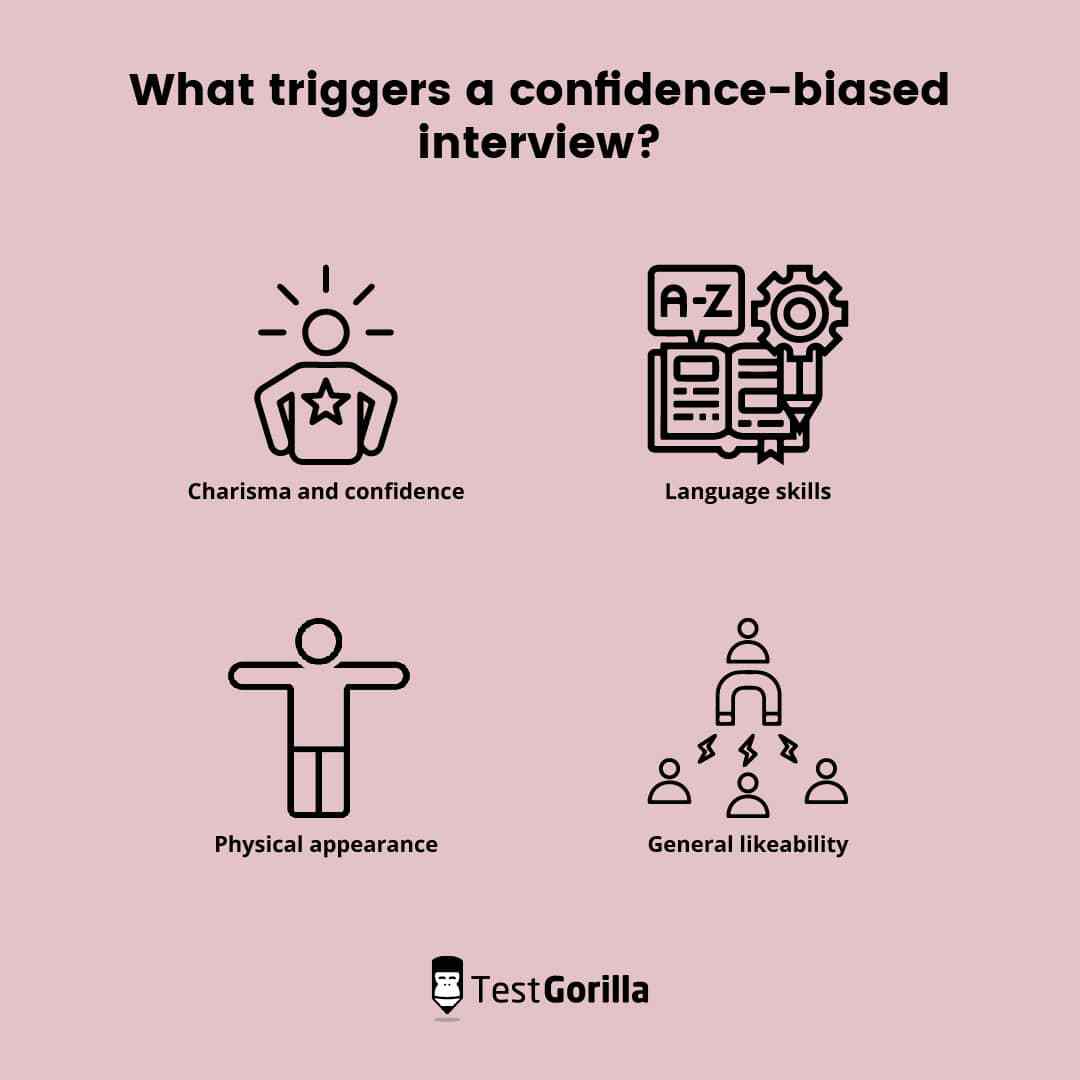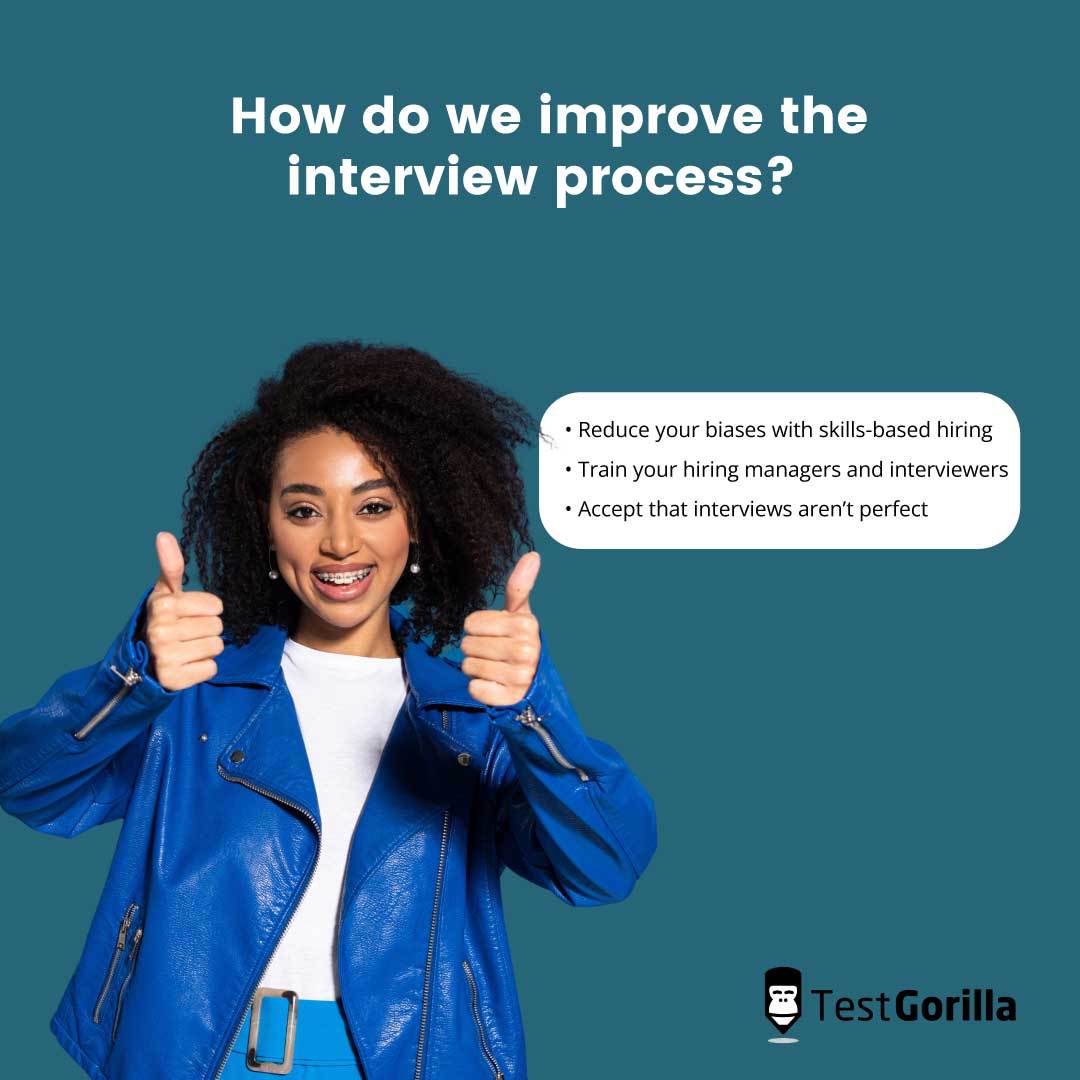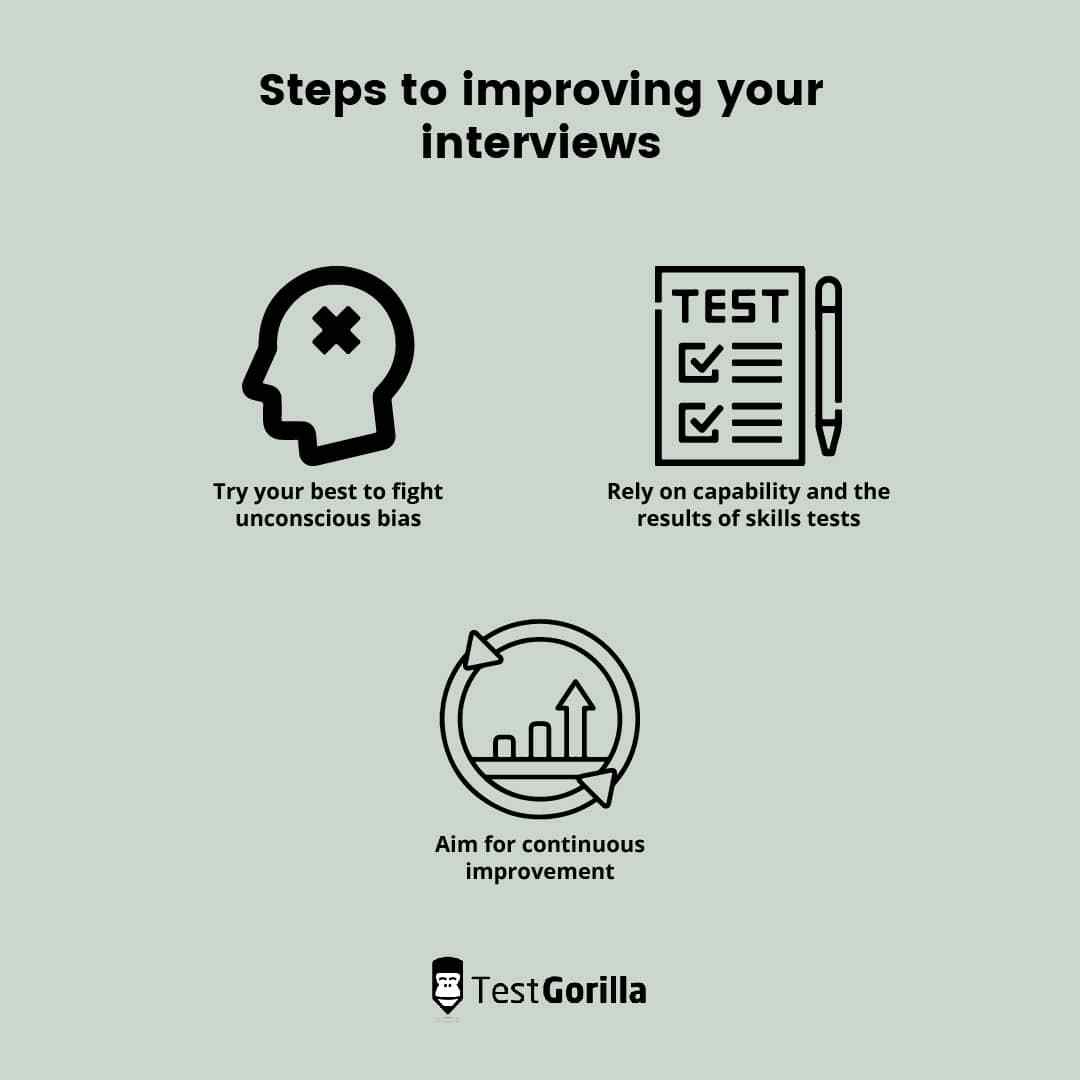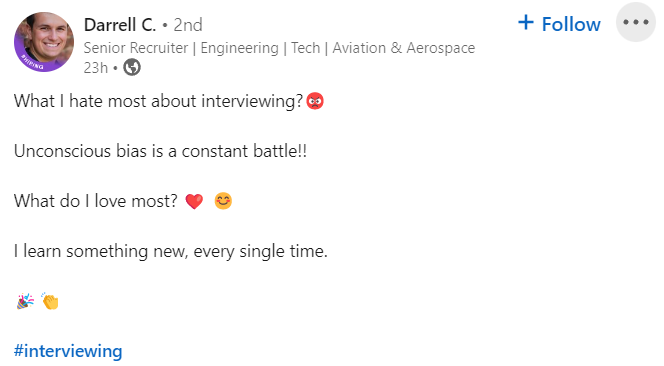Unconscious bias at the interview table: The best candidates aren’t always the best interviewees
“Confidence is the most essential skill you bring to a job interview.”
Many well-intentioned professionals tell job seekers this, and for the most part, they’re unfortunately right.
A 2020 study showed that a candidate’s self-confidence has a significant influence on a recruiter’s decision and selection outcomes.[1]
When a hiring manager says an interview with a candidate went great, they mean the candidate showed charisma, confidence, and had the “right” physical appearance.
But do those factors tell you if the candidate could be an excellent programmer? Does charisma predict a graphic designer’s performance?
We believe the most essential skills you bring to a job interview are role-relevant ones, and interviews that rely heavily on confidence are weeding top talent out of your selection process.
This article discusses the impact of confidence in a job interview, the related factors that cause unconscious bias, and how we can begin to improve the process.
What is unconscious bias?
Unconscious bias is a natural, animal instinct in our brains that assists our decision-making.
It helps us take mental shortcuts to make decisions in the shortest possible time. This is useful in the wild or when deciding on what to eat for breakfast, but is seriously detrimental to hiring decisions.
This is similar to a “gut reaction” or a “snap judgment,” and often we don’t notice it’s happening, hence the term “unconscious.”
The results of studies on unconscious bias show just how sneaky it is: One of them showed that whilst over 70% of white people claimed no racial preference, they still showed pro-white preference in their test responses.[2]
Unconscious bias can negatively affect your recruitment process, especially your job interviews, without you even knowing it.
We put undue weight on interview performance
Unconscious bias is already damaging, but it holds even more power because we put a lot of emphasis on the outcome of a job interview.
We almost always consider a “successful” interview to include unshakable confidence and practiced charisma, an expectation that holds for both in-person and virtual interviews.
This difference alone leaves the door open for bias, as a candidate could be great at in-person interviews but not virtual ones (or vice versa).
Different skills are needed to ace a physical interview and a virtual interview, although both sets of skills are not necessarily relevant for the job in question.
Few roles need these skills for their daily responsibilities. Perhaps a charismatic interview could indicate performance in a sales professional, who needs people skills and negotiation skills regularly.
But for most roles, putting weight on confidence in an interview means you are judging a candidate on non-relevant skills.
There are similar implications around the skills needed to build the perfect resume. Is it necessary for a programmer or a warehouse worker to possess the right writing and design skills to create a great-looking resume?
Skills that aren’t role-relevant shouldn’t affect your judgment as a hiring manager. When they do, you could be letting a great candidate walk away – and worse yet, you could end up with a bad hire instead.
Studies have shown the impact this issue has on first-generation college students like Christelle Louis.
Christelle had identical credentials to her classmates, but because she was a first-generation college student, she always felt like she was a step behind.
These students tend to make less money, take jobs they are far overqualified for, and accept the first job offer they receive, regardless of what it is.
One study found that this is largely because they don’t possess the same connections and coaching as their peers. In other words, their parents can’t tell them what to do and what to say.[3]
Christelle’s story supports this study’s findings. She struggled with resumes and interviews, saying she thought that a resume was supposed to just list your work experience. An interview was just supposed to be a conversation.
Our interviews shouldn’t require extensive charisma coaching. They shouldn’t rely so heavily on how you say something, but on what you say and what skills you bring to the table.
The best insights on HR and recruitment, delivered to your inbox.
Biweekly updates. No spam. Unsubscribe any time.
What triggers a confidence-biased interview?
Let’s take a look at the many factors that can trigger our unconscious bias during a job interview.
Factors that constitute a “great interview” usually include:
Charisma and confidence
Language skills
Physical appearance
General likeability
Unfortunately, we perceive these factors like this:
Factor | Perceived as |
Charisma and confidence | Ability to perform the job |
Language skills | Intelligence |
Physical appearance | Professionalism |
Likeability | Character |
Interviews are a prime opportunity for bias to work its claws in, because an interviewer may not “like” awkward behavior, fidgeting, stuttering, or even someone’s outfit.
The interview becomes less about the role and turns into a bid to impress the interviewer instead. In the end, it isn’t about predicting capability or future performance, it’s about making the interviewer like you more.
Let’s look at these factors more closely to understand why they affect our bias so heavily.
Charisma and confidence
Charisma and confidence are frequently mistaken as capability.
Countless professionals advise job seekers to convince the interviewer they can do the job with their charisma. Many professionals also encourage candidates to memorize answers and recite them back in the mirror.
This isn’t an indication of capability (unless you’re interviewing an actor).
Confidence during an interview doesn’t equate to confidence in your ability. Many candidates have faith in their ability to perform the responsibilities and still feel nervous during interviews.
There are also candidates who try to avoid sounding self-assured because they don’t want to sound arrogant.
This practice can also be counterintuitive. The more we prioritize confidence, the more we instill a damaging mindset in candidates that causes further anxiety.
Many candidates with impostor syndrome struggle to have the “right” confidence in an interview, although they have immense skill and capability for the job.
To read more about this, read our article on skills-based hiring, impostor syndrome, and the Dunning-Kruger effect.
Language skills
We often equate language skills with intelligence. If a candidate expresses themselves well we’re more likely to believe they’re capable of doing the job we want them to do.
But a silver tongue doesn’t necessarily equal intelligence. Furthermore, putting this much stake in someone’s eloquence is a large issue when working with disabled candidates.
Language and communication disabilities can affect the way candidates speak during an interview, but don’t affect the way they write, design, or program software.
Learning to put less importance on the way someone communicates is a large step towards better disability inclusion in the workplace and makes your company a better, safer place for disabled employees.
Physical appearance
Physical appearance has a strong history of being associated with professionalism.
Many interviewers immediately judge a candidate when they walk through the door due to simple aesthetic factors, such as tattoos and piercings. In one study a shocking 4 out of 10 recruiters admitted to rejecting a suitable candidate because they had a visible tattoo.
But this is about more than tattoos and piercings. Unconscious bias can affect your perception of body language, clothing, and different hairstyles.
Unfortunately, it’s also common to judge a candidate on their age, race, size, and gender.
This bias is tied to the emphasis our brains put on physical attractiveness. We attribute strengths, weaknesses, and capabilities to someone because of an unconscious bias based on our personal preferences.
Likeability
Likeability is exactly as it sounds – how much the interviewer likes the candidate. We perceive how much we like someone as an indication of their character.
Judging likeability is a damaging bias and it can happen instantly.
One study showed that an interviewer gets an “impression” of a candidate in the first 10 seconds, then spends the rest of the time trying to prove themselves right.[4]
It’s called confirmation bias, and it’s the reason that Google uses structured interviews.[5]
Basing a hiring decision on likeability has been shown to negatively affect neurodivergent folks especially. One study showed that neurotypical people unconsciously view autistic people as “unlikeable.”
This is one of many factors that affect the huge employment gap for people with autism spectrum disorder (ASD). To read more, check out our article on the ASD employment gap.
The impact of confidence-biased interviews
So what happens when unconscious bias gets the better of you and you hire the most confident candidate, rather than focusing on their capability?
It’s more than ignoring a truly talented candidate – it stifles diversity efforts.
Focusing on confidence and charisma ensures you’ll end up with a team of similar people: The people who practiced charisma tactics in the mirror and rehearsed interview scripts.
This will shape your company culture, gradually making it homogenous.
The “cultural fit” issue stems from workplace homogeny.
Here at TestGorilla, we believe in culture add over culture fit. Culture add finds candidates with similar, but not identical, values and weaves them into your company to create a diverse range of perspectives and opinions.
Homogenous hiring can also affect your hiring managers’ opinions.
If they’ve never hired a candidate with piercings, tattoos, or a lack of confidence, they’ll end up with a very specific idea of what a successful candidate looks like – i.e. confident, with no tattoos or piercings. So homogenous hiring is caused by bias, and can also be a cause of bias. Without intervention, it’s a self-fulfilling prophecy. .
Bias like this also affects the gender employment gap, because HR professionals may “get used to” hiring men and equate performance to gender without realizing it.
Allowing confidence to hold such power over your hiring decisions hampers recruiting efforts, which increases the chance of a mis-hire. This means you’re missing out on top talent and wasting thousands of dollars on a bad hire.
But all of this can be avoided. Let’s talk about how to improve the process.
How do we improve the interview process?
We aren’t helpless in the face of unconscious bias.
There are powerful steps we can take to create a fairer interview process that’s a better indicator of capability.
Let’s explore these top strategies to improve the interview process:
Reduce your biases with skills-based hiring
Train your hiring managers and interviewers
Accept that interviews aren’t perfect
Reduce your biases with skills-based hiring
Skills-based hiring helps you reduce the effects of hiring biases so you can recruit and train the best candidates.
Using assessments helps recruiters and hiring managers focus on a candidate’s skills, which means it drastically reduces the bias we have through all stages of the hiring process.
Skills tests help you to objectively assess a candidate’s skills before you reach the interview stage. That way, you already know their capabilities even if it turns out to be an “awkward interview.”
You don’t necessarily need your programmer to be charismatic – you just need them to ace the Kotlin Coding test.
Additionally, you can also include our Communication test or Negotiation test to assess charisma-based skills, enabling you to see how much of their behavior is just “interview nerves.”
How about the next step? Can we make the interview skills-based?
We recommend structured interviews, which have predetermined criteria and use the same questions for every candidate. This levels the playing field and doesn’t rely on “impressing the interviewer.”
And structured interviews work, too. Traditional unstructured interviews only predict 14% of candidate performance, but structured interviews predict 26%.[5]
Another way to implement skills-based practices in your organization is by prioritizing upskilling and reskilling. If an interview doesn’t go exactly as you’d like, but you see that the candidate still has solid skills, you can fill in the gaps by identifying and addressing them with skills tests.
You can read more about this in our article on how to use skills tests to address internal skill gaps.
Want to see how technology can help reduce bias and make interviews fairer?
Our article on how conversational AI is changing high-stakes job interviews explores how conversational AI tools bring structure, transparency, and accountability to hiring decisions.
Train your hiring managers and interviewers
One way to combat unconscious bias is to train your hiring managers and interviewers on recognizing and identifying it.
We’d recommend coaching them and talking about bias during regular 1:1 meetings. You can also implement professional unconscious bias training.
Unconscious bias training has been getting a bad rap lately, with many employees saying it doesn’t do anything for them. This is because your unconscious bias training needs to be more than a checklist exercise.
Your training needs to be meaningful, and it certainly needs to be more than just stressing the legal implications of bias. One study found that this tactic only makes people feel singled out and that they’ll be blamed if something negative happens.[6]
So how do you convey the importance of unconscious bias?
Reframe the conversation so that it’s centered on this fact: Unconscious bias has a real impact on how leaders identify potential. Show them how bias affects the company and the candidate negatively, and explain that they’re in the position to put a stop to it.
It also helps to stress that unconscious bias affects everyone on different levels, not just the “bad apples.”
Unconscious bias is detrimental, but it happens to us all.
Accept that interviews aren’t perfect and aim for continuous improvement
One of the biggest steps to improving your interviews is to accept that they simply aren’t perfect.
That means adopting the right mindset and attitude:
Try your best to fight unconscious bias
Rely on capability and the results of skills tests
Aim for continuous improvement
Darrell Clack, a senior recruiter, words it well in this post:
But we won’t leave it at that. We have some solid advice to continuously improve your processes so your recruiting practices are more effective every time:
Give pulse surveys to current employees to ask them about their candidate experience
Try panel interviews; more interviewers means a broader range of opinions
Instill a mindset of continuous improvement in interviews (like Darrell above)
It’s a long road to eliminating unconscious bias, but as long as we’re making continuous improvements and have a mindset focused on learning, we’ll get there.
Adopt skills-based practices and don’t let confidence get in the way
Confidence and charisma have a history in job interviews as “must-haves” and “make or break” factors.
We think it’s about time that changed.
Unconscious bias is always present in some way or another during the hiring process, but if we’re mindful, we can reduce the amount of influence it holds over us.
Confidence doesn’t equal talent. By taking a skills-based approach to hiring, we can create a fairer interview process.
To learn more about skills-based hiring practices, read our blog post on the 10 best practices to apply skills-based hiring in your organization.
Sources
“Applicant’s Self Confidence Influence in Employment Interview Process According to Recruiters Perceptions. An Exploratory Study in Greece”. (March, 2020). ResearchGate. Retrieved February 21, 2023. https://www.researchgate.net/publication/340020160_Applicant’s_Self_Confidence_Influence_in_Employment_Interview_Process_According_to_Recruiters_Perceptions_An_Exploratory_Study_in_Greece
Nosek, Brian. (July 22, 2010). “Pervasiveness and correlates of implicit attitudes and stereotypes”. Taylor and Francis Online. Retrieved February 21, 2023. https://www.tandfonline.com/doi/full/10.1080/10463280701489053
Manzoni, Anna. (July 21, 2018). “The Equalizing Power of a College Degree for First-Generation College Students: Disparities Across Institutions, Majors, and Achievement Levels”. Springer Link. Retrieved February 21, 2023. https://link.springer.com/article/10.1007/s11162-018-9523-1
“The importance of first impressions in a job interview”. (May, 2000). ResearchGate. Retrieved February 21, 2023. https://www.researchgate.net/publication/313878823\_The\_importance\_of\_first\_impressions\_in\_a\_job\_interview
Bock, Laszlo. (April 7, 2015). “Here’s Google’s Secret to Hiring the Best People”. Wired. Retrieved February 21, 2023. https://www.wired.com/2015/04/hire-like-google/
Lai, Calvin. (April 19, 2018). “What’s unconscious bias training, and does it work?”. The Conversation. Retrieved February 21, 2023. https://theconversation.com/whats-unconscious-bias-training-and-does-it-work-95277
You've scrolled this far
Why not try TestGorilla for free, and see what happens when you put skills first.






















